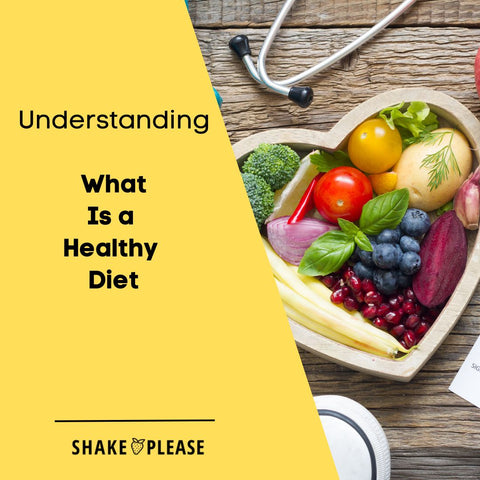
Introduction to a Healthy Diet
Maintaining a healthy diet is crucial for your overall well-being, as it provides the necessary nutrients to fuel your body and support its various functions.
A healthy diet is not just about losing weight or looking a certain way; it's about nourishing your body and mind to live a fulfilling, vibrant life.
In this comprehensive guide, we'll explore the key components of a healthy diet, the importance of balanced nutrition, and practical tips to incorporate healthier eating habits into your lifestyle.
The Importance of a Healthy Diet
A healthy diet is the foundation for a healthy life. By consuming a well-balanced and nutrient-rich diet, you can experience a wide range of benefits, including:
- Improved overall health: A healthy diet can reduce the risk of chronic diseases, such as heart disease, type 2 diabetes, and certain types of cancer.
- Increased energy and vitality: Proper nutrition provides your body with the energy it needs to function optimally, helping you feel more alert and energized throughout the day.
- Better weight management: A balanced diet, combined with regular physical activity, can help you achieve and maintain a healthy weight, reducing the risk of obesity-related health issues.
- Enhanced mental well-being: Certain nutrients found in a healthy diet, such as omega-3 fatty acids and B vitamins, can positively impact your mood and cognitive function.
- Stronger immune system: A diet rich in vitamins, minerals, and antioxidants can help strengthen your immune system, making you more resilient to illness and infection.
Components of a Healthy Diet
A healthy diet is composed of various macronutrients and micronutrients, all of which play a crucial role in maintaining your overall health.
Let's explore these components in more detail:
Macronutrients: Carbohydrates, Proteins, and Fats
Carbohydrates: Carbohydrates are the primary source of energy for your body. They come in two forms: simple carbohydrates (sugars) and complex carbohydrates (starches and fiber). Aim to incorporate more complex carbohydrates, such as whole grains, fruits, and vegetables, into your diet.
Proteins: Proteins are essential for the growth, repair, and maintenance of your body's tissues. They are made up of amino acids and can be found in a variety of plant-based and animal-based sources.
Fats: Fats are necessary for various bodily functions, including hormone production, nutrient absorption, and energy storage. However, it's important to focus on healthy fats, such as those found in avocados, nuts, seeds, and olive oil, while limiting your intake of saturated and trans fats.
Micronutrients: Vitamins and Minerals
Micronutrients are essential for supporting your body's various processes and maintaining optimal health. These include vitamins and minerals, such as:
- Vitamins: A, B-complex, C, D, E, and K
- Minerals: Calcium, iron, magnesium, potassium, and zinc
Consuming a variety of fruits, vegetables, whole grains, and lean proteins can help ensure you're getting the necessary micronutrients your body needs.
The Role of Fiber in a Healthy Diet
Fiber is an essential component of a healthy diet, as it plays a crucial role in supporting digestive health, regulating blood sugar levels, and promoting feelings of fullness.
Aim to incorporate a variety of high-fiber foods, such as whole grains, fruits, vegetables, legumes, and nuts, into your daily meals.
The Impact of a Healthy Diet on Weight Management
A healthy diet is closely linked to effective weight management. By focusing on nutrient-dense, whole foods and controlling your portion sizes, you can achieve a balanced calorie intake that supports a healthy weight.
Additionally, a healthy diet can help regulate your metabolism, reduce cravings, and promote feelings of fullness, making it easier to maintain a healthy weight over time.
Portion Sizes and Calorie Intake of a Healthy Diet
Portion control is a crucial aspect of a healthy diet. While the specific calorie needs vary based on factors like age, gender, and activity level, general guidelines suggest aiming for a daily calorie intake of:
- Women: 1,600-2,400 calories per day
- Men: 2,000-3,000 calories per day
It's important to be mindful of your portion sizes and to focus on nutrient-dense, whole foods rather than empty calories from processed or high-fat foods.
Tips for Maintaining a Healthy Diet
Adopting a healthy diet can be a lifelong journey, but with the right strategies, it can become a sustainable and enjoyable part of your lifestyle. Here are some tips to help you maintain a healthy diet:
- Plan and Prepare: Meal planning and meal prepping can help you stay on track with your healthy eating goals, as it reduces the temptation to make unhealthy choices when you're short on time.
- Incorporate Variety: Eating a wide variety of nutrient-rich foods, such as fruits, vegetables, whole grains, lean proteins, and healthy fats, can help ensure you're getting all the necessary vitamins and minerals.
- Hydrate Properly: Staying hydrated by drinking plenty of water throughout the day is essential for maintaining overall health and supporting your body's various functions.
- Listen to Your Body: Pay attention to how different foods make you feel, and adjust your diet accordingly. Some people may have sensitivities or intolerances to certain foods, which can impact their overall well-being.
- Embrace Moderation: It's important to find a balance and allow yourself to enjoy occasional indulgences without feeling guilty. Moderation is key to a sustainable and enjoyable healthy lifestyle.
Common Misconceptions About Healthy Eating
There are many misconceptions and myths surrounding healthy eating that can hinder your progress. It's important to separate fact from fiction and approach your health journey with an open and informed mindset. Some common misconceptions include:
- Healthy eating is restrictive and boring: A healthy diet can be delicious, satisfying, and full of variety.
- All fats are bad: Not all fats are created equal. Healthy fats, such as those found in avocados, nuts, and olive oil, are essential for your body.
- Carbohydrates are the enemy: Carbohydrates are a necessary macronutrient, and it's the type and quantity of carbs that matter most.
- Supplements can replace a healthy diet: While supplements can be beneficial in some cases, they should not be used as a substitute for a balanced, nutrient-rich diet.
- Healthy eating is expensive: With some planning and creativity, it's possible to maintain a healthy diet on a budget.
Benefits of a Healthy Diet on Physical and Mental Health
Embracing a healthy diet can have a profound impact on both your physical and mental well-being. Some of the key benefits include:
Physical Health Benefits:
- Reduced risk of chronic diseases, such as heart disease, type 2 diabetes, and certain types of cancer
- Improved immune function and reduced susceptibility to illness
- Better weight management and reduced risk of obesity-related health issues
- Enhanced energy levels and overall physical performance
Mental Health Benefits:
- Improved mood and reduced symptoms of depression and anxiety
- Enhanced cognitive function, including better memory, focus, and problem-solving skills
- Reduced stress and improved ability to cope with life's challenges
- Better sleep quality and more restful sleep
Healthy Diet Recommendations for Different Age Groups
While the core principles of a healthy diet remain the same, there are some nuances to consider based on your age and stage of life. Here are some general healthy diet recommendations for different age groups:
Children and Adolescents:
- Focus on nutrient-dense, whole foods
- Encourage a balanced intake of carbohydrates, proteins, and healthy fats
- Limit added sugars and processed foods
- Promote physical activity and healthy lifestyle habits
Adults:
- Maintain a balanced diet with a variety of fruits, vegetables, whole grains, lean proteins, and healthy fats
- Pay attention to portion sizes and calorie intake
- Incorporate regular physical activity into your routine
- Stay hydrated and limit alcohol consumption
Older Adults:
- Ensure adequate intake of protein, calcium, and vitamin D to support bone health
- Focus on nutrient-dense foods that are easy to digest
- Stay physically active and engage in strength-training exercises
- Consult with a healthcare professional for personalized dietary recommendations
How to Create a Balanced Meal Plan
Developing a balanced meal plan is an essential step in maintaining a healthy diet. Here's a general framework to help you get started:
- Determine Your Calorie Needs: Consider your age, gender, activity level, and health goals to estimate your daily calorie requirements.
- Balance Macronutrients: Aim for a balanced intake of carbohydrates, proteins, and healthy fats at each meal.
- Include a Variety of Nutrient-Dense Foods: Incorporate a wide range of fruits, vegetables, whole grains, lean proteins, and healthy fats into your meals and snacks.
- Hydrate Properly: Drink plenty of water throughout the day and limit sugary beverages.
- Plan and Prepare: Meal planning and meal prepping can help you stay on track and make healthier choices.
- Allow for Flexibility: Don't be too rigid; incorporate occasional indulgences and enjoy your meals without guilt.
HEALTHY EATING ON THE GO: TIPS AND TRICKS
Resources for Further Information on Healthy Eating
If you're looking to deepen your understanding of healthy eating and nutrition, consider exploring the following resources:
- Reputable Health Organizations: Organizations like the World Health Organization (WHO), the Centers for Disease Control and Prevention (CDC), and the American Heart Association (AHA) offer a wealth of information and guidelines on healthy eating.
- Nutrition Experts and Registered Dietitians: Consulting with a qualified nutrition professional can provide personalized guidance and support for your health goals.
- Reliable Online Resources: Websites like the Mayo Clinic, the Academy of Nutrition and Dietetics, and the National Institutes of Health offer comprehensive, evidence-based information on various aspects of healthy eating.
- Nutrition-Focused Books and Podcasts: Explore books, podcasts, and other educational materials that delve into the science and practical application of healthy eating.
THE ULTIMATE GUIDE TO SMOOTHIE DIET DELIVERY
Conclusion: Embracing a Healthy Lifestyle Through Proper Nutrition
Adopting a healthy diet is not just about following a set of rules or restrictions; it's about nourishing your body and mind to live a fulfilling, vibrant life.
By understanding the key components of a healthy diet, the importance of balanced nutrition, and practical strategies for maintaining healthy eating habits, you can take control of your health and well-being.
With the right mindset and the support of the resources and information provided in this guide, you can embark on a transformative journey towards a healthier, happier you.
Embrace the process, be patient with yourself, and celebrate the small victories along the way.
Remember, a healthy diet is a journey, not a destination.





